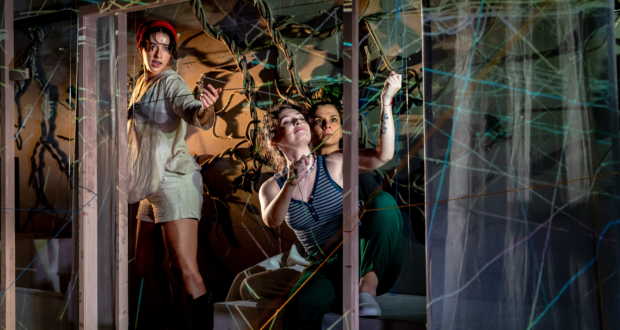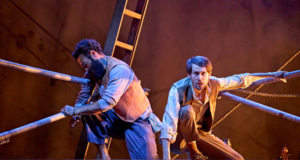A highly relevant and powerful performance that contrasts global solidarity and support for refugees against a fear borne of exclusion and dwindling natural resources. As the Earth burns, the menace is palpable. Summary
Rating
Good
The white noise of discordant police sirens welcomes the audience as they arrive, played against a set of mismatched weather-worn window frames overlooking a city. Interwoven fishing lines are fixed to the back of the stage, both an eruv – a form of Jewish net enclosure – and the interconnecting lives of a global population. Set designer Ingrid Hu has created something that is arresting and symbolic despite the small stage.
In The Net is set in fraught, drought-ridden, pre-apocalyptic north London two years from now. Tied to their weekly allowance of clean water, half-sisters Laura (Carlie Diamond) and Anna (Anya Murphy) are grieving the recent death of Laura’s mum. Laura wants to create an eruv using interconnecting yarn, from the roof of the house down to the garden through the trees, but Anna urges caution and reflection time. They are joined on stage by Hala (Suzanne Ahmet) a Syrian refugee, who has experienced horrific trauma in trying to reach the relative safety of the UK and is now under constant police surveillance and repeatedly challenged to prove who she is. The family are under observation for providing refuge to her.
A complex and thoughtful script, this play connects highly relevant themes of global solidarity and support against a backdrop of fear borne of dwindling natural resources. As the Earth burns, refugees are desperate to find shelter in wetter, cooler climes, but some inhabitants of such places become hostile in their desire to keep the strangers out. Reinforced by bureaucratic authority in the form of local councillors or immigration officers, the menace is real. The idea of the eruv, meaning mixture, was created 2000 years ago to allow Jews a safe space to more realistically observe the laws of the Sabbath. It is designed to set you free and is a place to gather and share bread in your net, says Laura. But a net can mean entanglement and inclusion to the exclusion of others. Aggression is inevitable.
There is much to like in this performance: suspicion of and aggression against strangers, with a heady mix of religious variation, is hardly new, but the current climate crisis adds another dimension of anxiety. Lighting by Jonathan Chan is spectacular and the second half of the performance is transformed by intersecting lines of light representing the final eruv. All performances are solid despite inexperience from some of the cast, and the concept of family grief played against a world similarly suffering works. Despite minimal available space, Tony Bell, playing a variety of characters, enters and exits amongst the audience. I’m always a fan of such a device: it creates an intimacy with the audience and changes perspective. Bravo.
However the nuance and complexity of the script may be a little too much. I wanted to read this as a novel, revel in the care and glory of the words and their connections, pause a little. But the demands of a live performance mean that we move on, almost too quickly, and the end of the production feels sudden; far too sudden in comparison to the care and thought that precedes it. In the Net launches Misha Levkov’s playwriting career and is the first in a series of work that will include a trilogy of plays and a novel weaving political and private lives in the present day. Future work will undoubtedly be carefully constructed, highly relevant and thought provoking, but a considered difference of the writing style needed in a novel versus a script for a live performance will take this to the next level.
Written by: Misha Levkov
Directed by: Vicky Moran
Set Designer: Ingrid Hu
Lighting Designer: Jonathan Chan
Produced by: Wolab
In The Net plays at Jermyn Street Theatre until 4 February 2023. Further information and bookings can be found here.
 Everything Theatre Reviews, interviews and news for theatre lovers, London and beyond
Everything Theatre Reviews, interviews and news for theatre lovers, London and beyond



